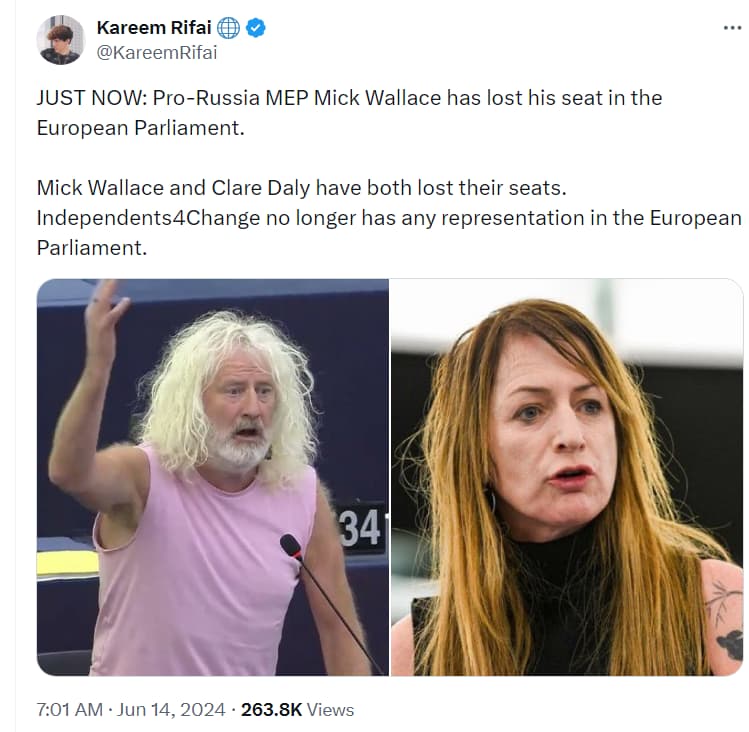At some point the world will work out that all the wokeness being spruiked is actually feeding the far-right parties and having an opposite effect to what was intended.
Ciotti, the leader of the Conservatives, allegedly privately took his proposal through France’s answer to Murdoch, a billionaire Bollore, who owns some French media, including France Dimanche. He had replaced the editor of France Dimanche with someone unacceptable to French journalists, causing a long running strike.
Fortunately for the French, there are much tighter regulations which restrain a Murdochracy and the equivalent of our ABC has a much freer hand and is less timid than our ABC. And journalists are bolder.
Also the French public have access to other Continental European media, which give wider perspectives than the UK and US media.
Much of the French media is available in EL and paywalls are different, allowing for a summary read before the paywall kicks in ( so we are not just given rage bait headlines).
Big punch up in Italian Parliament over the proposal to give greater autonomy to the regions, after the Risorgimento movement made Italy a nation.
In Germany, the far right dominates in East Germany, comes fourth in the West. Unification still has a way to go.
In France, despite the political upheavals, everyone is committed to the French Republic.
That thread is amazing.
Yes. In the French multiparty system, it can be tough trying to get a fix on the French acronyms for the different Parties when trawling through the French MSM. Colour coding doesn’t work there.
The New Popular Front has had to adopt about 5 different colours as its symbol.
The psephs initial analyses have attributed the Nordic bucking of the far right trend in the EU elections to Ukraine and climate change ( support for the Left and the Greens, who were wiped out in Germany, where the Green political movement was once influential ).
In France, analysis of social cohesion did not attribute race and immigration as a pattern for the Far Right tsunami. Instead, the initial analysis of the strongest support for the Far Right suggested that education levels and unemployment in regions as the main common threads in the cable.
This assessment would influence the way in which the New Popular Front promotes its appeal to the voter in the French Parliamentary elections ( job security and social security insurance for the laid off worker, retirement age for manual worker to access the pension etc).
The Nordic countries haven’t gone to the right as they don’t have the same hot issue of immigration. The number of countries moving to the right is increasing in Europe due to immigration.
Migration in Sweden is a hot issue. The right wing nationalist party gained one seat, but this was offset by gains in more left leaning parties. The Social Democrats hold the most seats ( unchanged) .
Denmark has taken a tougher stand on migration, while Norway has aligned with EU policy.
Finland has toughened its asylum policies and has become more restrictive on migration ( in part linked to Russian inflows).
A few Nordics could view themselves as the most vulnerable in Europe if Russia were to extend its military attacks beyond Ukraine. There are major NATO bases not far from Russian bases in the region.
ADD
Nordics are generally more affluent, have strong social welfare and don’t have the same cost of living pressures as most other EU members. Climate change is still high on their agendas.
Russians still have a strong presence in the North of Norway and still own and operate some port areas too unfortunately. I don’t think the Norwegians want to rock the boat so to speak for now
They didn’t get to vote in the EU elections, but their views and priorities would probably align with the Nordic EU members.
My reading on this is the shift to the right only happened in about 3 major nations, in many others the shift was to the left. The overall impact to the EU parliament was the balance is largely unchanged. The big headlines are lacking the nuance that European politics requires.
Interesting that the Greens got obliterated in Germany. They were the driving force behind decommissioning the entire nuclear industry, which has crippled climate efforts and handcuffed Germany to Russian gas. Since the war began and gas supplies were cut, Germany’s economy has been crippled. Don’t know if this was the direct cause for the Greens struggling, but it seems logical. The other thing that’s interesting about Germany is the East Germany territory voted right, so this is a legacy of the Cold War still being seen.
France… dunno what’s going down other than it’s hilarious. I’m going to be there on election day and it has potential to be memorable.
The rise of the Greens in Germany goes back to the seventies/eighties and the potential deforestation of German forests with acid rain caused by coal pollution. There was also the complication of lignite in East Germany.
A decision was made to move away from coal in the mid eighties and abandonment of the coal pfenning, to replace with nuclear. Three Mile Island in the US , followed by Chernobyl, was an enormous shock. Except in France, nuclear was out and the Greens were more empowered. At the same time, there was an undercurrent of suspicion, with some saying that cut a Green and they bleed Red. This was at a time of terrorists in West Europe, Bader Meinhoff type groups spilling beyond Germany’s borders.
As to East Germany, the dismantling of its economic base with the market economy of West Germany taking over the means of production. The unification of Germany was not so smooth as portrayed and from the perspective of social cohesion, there has been a lot of papering over the cracks.
Global financial crises and the response of Merkel, the paymaster of Europe, brought further disenchantment and alienation from centrist and left leaning political groups. For me, no surprise at the rise of populist far right in East Germany.
Not the whole story though on the German Greens, they also became more widespread with good social policy on a wider range of issues. With the looming destruction of much of Germany with pollution, acid rain, forest death and toxic rivers, Greens were relevant and mainstream. Something they do not learn here.
The rise of the Greens in Germany also reflects German history going back to the thirties, an alternative to the establishment Party structure , which proved powerless to stem the rise of Hitler.
The German Greens were at one point favorites for the Chancellorship and were leading in the polls before a series of self-inflicted blunders rendered them into their current situation.
They embraced neoliberalism far moreso than their international counterparts which cost them a lot of grassroots support, then fell apart through some stupifying scandals.
sounds like the local Greens
In Belgian elections, Socialists and Greens go down in Wallonia, but no shift to the far right, Conservatives hold in Flanders.
Bardella kicks an own goal for Le Pen’s Party in France, referring to French citizens and other French citizens not of French origin. It brings back memories of Le Pen saying earlier that the French soccer team should have a limit on imports. Only one of the team was a so-called import, the others all French born.
L’Equipe, the French sports rag ( the equivalent of Australia’s defunct Sporting Globe) had a front page article on the elections, noting the high profile of Mbappe and others in calling for the young to register to vote and warning against voting for the far right.
Others are warning against leaving it to vote until the second round, which is what happened in a Presidential election - a run off between Le Pen and Macron…
Wow. Shades of 2016 and Brexit.
Elections of individual candidates for Parliament are more complex than for the second round of Presidential elections,
If a candidate obtains 50% of the votes in the electorate and at least 25% of the registered votes in the electorate, no second round.
The top two candidates in an electorate otherwise go to a run off in the second round.
Additionally, any candidate who receives a number of votes equivalent to at least 12.5% of registered voters in the electorate goes through to the second round. Thus, there could be a 3 or 4 way run off on 7 July.
Le Monde is doing an updated map of electorates as votes come in.

